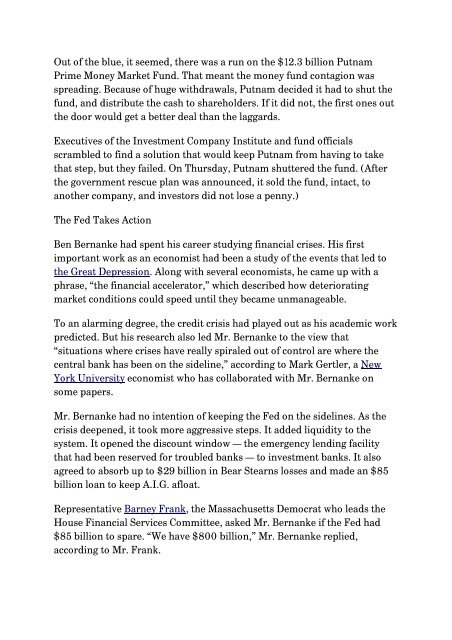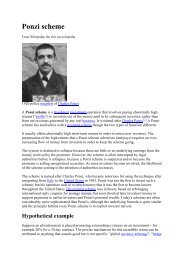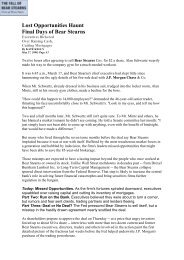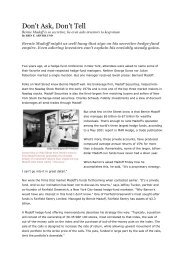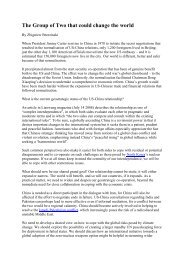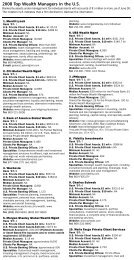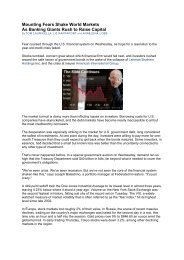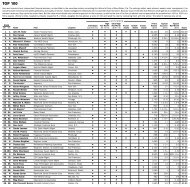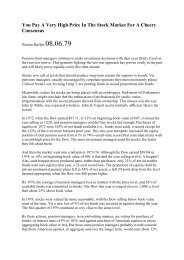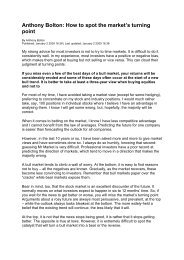As Credit Crisis Spiraled, Alarm Led to Action - Morningbull
As Credit Crisis Spiraled, Alarm Led to Action - Morningbull
As Credit Crisis Spiraled, Alarm Led to Action - Morningbull
You also want an ePaper? Increase the reach of your titles
YUMPU automatically turns print PDFs into web optimized ePapers that Google loves.
Out of the blue, it seemed, there was a run on the $12.3 billion Putnam<br />
Prime Money Market Fund. That meant the money fund contagion was<br />
spreading. Because of huge withdrawals, Putnam decided it had <strong>to</strong> shut the<br />
fund, and distribute the cash <strong>to</strong> shareholders. If it did not, the first ones out<br />
the door would get a better deal than the laggards.<br />
Executives of the Investment Company Institute and fund officials<br />
scrambled <strong>to</strong> find a solution that would keep Putnam from having <strong>to</strong> take<br />
that step, but they failed. On Thursday, Putnam shuttered the fund. (After<br />
the government rescue plan was announced, it sold the fund, intact, <strong>to</strong><br />
another company, and inves<strong>to</strong>rs did not lose a penny.)<br />
The Fed Takes <strong>Action</strong><br />
Ben Bernanke had spent his career studying financial crises. His first<br />
important work as an economist had been a study of the events that led <strong>to</strong><br />
the Great Depression. Along with several economists, he came up with a<br />
phrase, “the financial accelera<strong>to</strong>r,” which described how deteriorating<br />
market conditions could speed until they became unmanageable.<br />
To an alarming degree, the credit crisis had played out as his academic work<br />
predicted. But his research also led Mr. Bernanke <strong>to</strong> the view that<br />
“situations where crises have really spiraled out of control are where the<br />
central bank has been on the sideline,” according <strong>to</strong> Mark Gertler, a New<br />
York University economist who has collaborated with Mr. Bernanke on<br />
some papers.<br />
Mr. Bernanke had no intention of keeping the Fed on the sidelines. <strong>As</strong> the<br />
crisis deepened, it <strong>to</strong>ok more aggressive steps. It added liquidity <strong>to</strong> the<br />
system. It opened the discount window — the emergency lending facility<br />
that had been reserved for troubled banks — <strong>to</strong> investment banks. It also<br />
agreed <strong>to</strong> absorb up <strong>to</strong> $29 billion in Bear Stearns losses and made an $85<br />
billion loan <strong>to</strong> keep A.I.G. afloat.<br />
Representative Barney Frank, the Massachusetts Democrat who leads the<br />
House Financial Services Committee, asked Mr. Bernanke if the Fed had<br />
$85 billion <strong>to</strong> spare. “We have $800 billion,” Mr. Bernanke replied,<br />
according <strong>to</strong> Mr. Frank.


